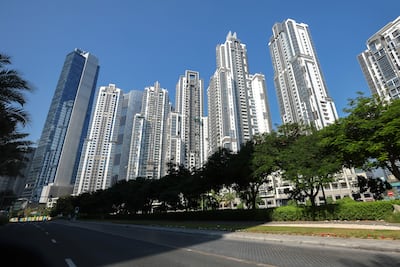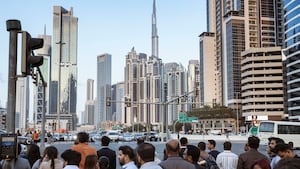Globe-trotting residents fuelling a population boom in the UAE have told how new career opportunities, high quality schooling and the prospect of greater financial security and safety prompted them to set up home in the country.
Newcomers drawn from as far afield as India, the UK and Denmark have opened up on their decision to seek out new horizons in the Emirates as an influx of overseas talent continues to spur economic growth.
It was revealed this week that Abu Dhabi's population has now surpassed four million, fuelled by a 9 per cent increase to its workforce in 2024, while Dubai is primed to hit the same landmark figure this year.
Sharjah's population grew from 1.4 million in 2015 to 1.8 million in 2022, the emirate's most recent census in 2023 revealed.
'Selling Saadiyat'
Among those making the move are Justin and Jaime Cooke, a husband and wife who relocated with their two sons to Abu Dhabi in August 2024 from a countryside estate near Royal Tunbridge Wells in England. “We had been considering leaving the UK for quite some time. While in many ways we had an idyllic life, we felt the need for change,” said Mr Cooke.
After evaluating destinations as varied as Canada, California, the Balearic Islands and Dubai, it was Abu Dhabi that eventually ticked all the boxes for “education, lifestyle, security, culture, business and economic security and opportunity, proximity to family, global connectivity”.
Education proved decisive. “Jaime was amazed by the education system here and the plethora of schools to choose from,” added Mr Cooke. That discovery was made even sweeter when they learned that their children’s former head teacher in the UK is now running Brighton College Abu Dhabi.
The family now lives on Saadiyat Island. “We have swapped the lush green rolling hills of Kent for the idyllic white sands, turquoise waters, turtles, dolphins and mangroves of Saadiyat, the world’s most concentrated cultural quarter,” they said.
For Ms Cooke, the transition has also opened up new personal and professional avenues. “Jaime has become a real estate broker very much ‘Selling Saadiyat’ and has already chalked up more than 100 million of sales,” said Mr Cooke. “In between that she teaches Pilates... as well as DJ’ing at some of Abu Dhabi’s coolest beach clubs under her moniker, DJ Cookie.”
From Mumbai to Dubai
Another newcomer banking on the city’s property sector is Umang Lakhani, who arrived from Mumbai three months ago. “I’ve never lived anywhere else, but I’ve travelled a lot,” he told The National. As a property and land broker, he has high hopes for his career, as he taps into one of the UAE’s fastest-growing industries.
In 2024, Dubai saw 226,000 real estate transactions valued at a record Dh761 billion, a 36 per cent jump in volume compared to the previous year. In June, a Deutsche Bank report showed Dubai has recorded the highest growth globally for city centre property prices per square metre over the past five years.
While he is inspired by the career potential his new home holds, he said living here is not always easy. “The most challenging thing here is expenses,” he said, although this won’t deter him yet, as he also sees so many advantages to living here. “There are days where I want to stay here forever … The people out here surprise me as they all live like one family.”
Education sector a major draw
While the UAE becomes a haven for the wealthy - the country is expected to attract a record 9,800 relocating millionaires this year alone, according to Henley & Partners Wealth Migration Report 2025 - it is also seeing people from all income brackets arrive.
Take Mohammad Joun, a university student who moved from Karachi to Dubai in January. His decision was more practical. Initially intending to study in Germany, logistical hurdles shifted his plans.
“Dubai became a life saver, a very practical one,” he said. With a strong family network in the UAE, including grandparents and aunts, Dubai quickly became an obvious new choice. “Living with my grandparents felt like the best decision,” he said.
Though the adjustment was difficult at first, Mr Joun has settled into university life and enjoys the multicultural nature of the city. “I now have friends from Sri Lanka, Singapore, Iran and Mauritania – along with many fellow Pakistani and Indian students. It’s been a really enriching experience.”
Still, the cost of living has been an eye-opener. “Almost everything here is three to four times more expensive than back home,” he said, adding that his daily university commute between Sharjah and Dubai costs around Dh31, a big expense for a student. “Managing finances here requires constant awareness.”
'Positively surprised'
Anne Kidmose, originally from Denmark, has also experienced challenges since moving to Dubai in May from Tanzania with her husband and infant son. But this is mostly down to the summer heat and fewer opportunities to walk around the city. Otherwise, she’s been “positively surprised” so far.
“We just started our family," she said. “We wanted to see the world and also try to move ahead with our lives. It’s very family-friendly here. People help out a lot. Even though we’ve only been here for a few weeks, we’ve met people from all over the world.”
Ms Kidmose has also been struck by the city's culture, despite global perceptions. “People told me there is this conception about Dubai as a place of glitz and big cars and tall buildings. I guess that’s also true, but what I’ve seen is there are also other cultural layers when you dig deeper.”
The bio
Favourite food: Japanese
Favourite car: Lamborghini
Favourite hobby: Football
Favourite quote: If your dreams don’t scare you, they are not big enough
Favourite country: UAE
THE BIO
Family: I have three siblings, one older brother (age 25) and two younger sisters, 20 and 13
Favourite book: Asking for my favourite book has to be one of the hardest questions. However a current favourite would be Sidewalk by Mitchell Duneier
Favourite place to travel to: Any walkable city. I also love nature and wildlife
What do you love eating or cooking: I’m constantly in the kitchen. Ever since I changed the way I eat I enjoy choosing and creating what goes into my body. However, nothing can top home cooked food from my parents.
Favorite place to go in the UAE: A quiet beach.
DAY%20ONE%20RESULT
%3Cp%3E%3Cbr%3E1.%20Charlotte%20Kool%20(NED)%20%E2%80%93%20Team%20DSM%3A%202hrs%2C%2047min%2C%2014sec%3Cbr%3E2.%20Lorena%20Wiebes%20(NED)%20%E2%80%93%20Team%20SD%20Worx%3A%20%2B4%20secs%3Cbr%3E3.%20Chiara%20Consonni%20(ITA)%20%E2%80%93%20UAE%20Team%20ADQ%3A%20%2B5%20secs%3C%2Fp%3E%0A
The biog
DOB: March 13, 1987
Place of birth: Jeddah, Saudi Arabia but lived in Virginia in the US and raised in Lebanon
School: ACS in Lebanon
University: BSA in Graphic Design at the American University of Beirut
MSA in Design Entrepreneurship at the School of Visual Arts in New York City
Nationality: Lebanese
Status: Single
Favourite thing to do: I really enjoy cycling, I was a participant in Cycling for Gaza for the second time this year
Gulf Under 19s final
Dubai College A 50-12 Dubai College B
Ferrari 12Cilindri specs
Engine: naturally aspirated 6.5-liter V12
Power: 819hp
Torque: 678Nm at 7,250rpm
Price: From Dh1,700,000
Available: Now
The years Ramadan fell in May
Specs
Engine: Dual-motor all-wheel-drive electric
Range: Up to 610km
Power: 905hp
Torque: 985Nm
Price: From Dh439,000
Available: Now
The specs: 2018 Ducati SuperSport S
Price, base / as tested: Dh74,900 / Dh85,900
Engine: 937cc
Transmission: Six-speed gearbox
Power: 110hp @ 9,000rpm
Torque: 93Nm @ 6,500rpm
Fuel economy, combined: 5.9L / 100km
Our family matters legal consultant
Name: Hassan Mohsen Elhais
Position: legal consultant with Al Rowaad Advocates and Legal Consultants.
How to help
Send “thenational” to the following numbers or call the hotline on: 0502955999
2289 – Dh10
2252 – Dh 50
6025 – Dh20
6027 – Dh 100
6026 – Dh 200
Top%2010%20most%20competitive%20economies
%3Cp%3E1.%20Singapore%0D%3Cbr%3E2.%20Switzerland%0D%3Cbr%3E3.%20Denmark%0D%3Cbr%3E4.%20Ireland%0D%3Cbr%3E5.%20Hong%20Kong%0D%3Cbr%3E6.%20Sweden%0D%3Cbr%3E7.%20UAE%0D%3Cbr%3E8.%20Taiwan%0D%3Cbr%3E9.%20Netherlands%0D%3Cbr%3E10.%20Norway%0D%3Cbr%3E%3C%2Fp%3E%0A
Silent Hill f
Publisher: Konami
Platforms: PlayStation 5, Xbox Series X/S, PC
Rating: 4.5/5
What is Reform?
Reform is a right-wing, populist party led by Nigel Farage, a former MEP who won a seat in the House of Commons last year at his eighth attempt and a prominent figure in the campaign for the UK to leave the European Union.
It was founded in 2018 and originally called the Brexit Party.
Many of its members previously belonged to UKIP or the mainstream Conservatives.
After Brexit took place, the party focused on the reformation of British democracy.
Former Tory deputy chairman Lee Anderson became its first MP after defecting in March 2024.
The party gained support from Elon Musk, and had hoped the tech billionaire would make a £100m donation. However, Mr Musk changed his mind and called for Mr Farage to step down as leader in a row involving the US tycoon's support for far-right figurehead Tommy Robinson who is in prison for contempt of court.
Islamophobia definition
A widely accepted definition was made by the All Party Parliamentary Group on British Muslims in 2019: “Islamophobia is rooted in racism and is a type of racism that targets expressions of Muslimness or perceived Muslimness.” It further defines it as “inciting hatred or violence against Muslims”.
GIANT REVIEW
Starring: Amir El-Masry, Pierce Brosnan
Director: Athale
Rating: 4/5
GAC GS8 Specs
Engine: 2.0-litre 4cyl turbo
Power: 248hp at 5,200rpm
Torque: 400Nm at 1,750-4,000rpm
Transmission: 8-speed auto
Fuel consumption: 9.1L/100km
On sale: Now
Price: From Dh149,900
Qosty Byogaani
Starring: Hani Razmzi, Maya Nasir and Hassan Hosny
Four stars
MATCH INFO
Karnataka Tuskers 110-5 (10 ovs)
Tharanga 48, Shafiq 34, Rampaul 2-16
Delhi Bulls 91-8 (10 ovs)
Mathews 31, Rimmington 3-28
Karnataka Tuskers win by 19 runs
PRO BASH
Thursday’s fixtures
6pm: Hyderabad Nawabs v Pakhtoon Warriors
10pm: Lahore Sikandars v Pakhtoon Blasters
Teams
Chennai Knights, Lahore Sikandars, Pakhtoon Blasters, Abu Dhabi Stars, Abu Dhabi Dragons, Pakhtoon Warriors and Hyderabad Nawabs.
Squad rules
All teams consist of 15-player squads that include those contracted in the diamond (3), platinum (2) and gold (2) categories, plus eight free to sign team members.
Tournament rules
The matches are of 25 over-a-side with an 8-over power play in which only two fielders allowed outside the 30-yard circle. Teams play in a single round robin league followed by the semi-finals and final. The league toppers will feature in the semi-final eliminator.
Labour dispute
The insured employee may still file an ILOE claim even if a labour dispute is ongoing post termination, but the insurer may suspend or reject payment, until the courts resolve the dispute, especially if the reason for termination is contested. The outcome of the labour court proceedings can directly affect eligibility.
- Abdullah Ishnaneh, Partner, BSA Law
Key facilities
- Olympic-size swimming pool with a split bulkhead for multi-use configurations, including water polo and 50m/25m training lanes
- Premier League-standard football pitch
- 400m Olympic running track
- NBA-spec basketball court with auditorium
- 600-seat auditorium
- Spaces for historical and cultural exploration
- An elevated football field that doubles as a helipad
- Specialist robotics and science laboratories
- AR and VR-enabled learning centres
- Disruption Lab and Research Centre for developing entrepreneurial skills
EPL's youngest
- Ethan Nwaneri (Arsenal)
15 years, 181 days old
- Max Dowman (Arsenal)
15 years, 235 days old
- Jeremy Monga (Leicester)
15 years, 271 days old
- Harvey Elliott (Fulham)
16 years, 30 days old
- Matthew Briggs (Fulham)
16 years, 68 days old
German intelligence warnings
- 2002: "Hezbollah supporters feared becoming a target of security services because of the effects of [9/11] ... discussions on Hezbollah policy moved from mosques into smaller circles in private homes." Supporters in Germany: 800
- 2013: "Financial and logistical support from Germany for Hezbollah in Lebanon supports the armed struggle against Israel ... Hezbollah supporters in Germany hold back from actions that would gain publicity." Supporters in Germany: 950
- 2023: "It must be reckoned with that Hezbollah will continue to plan terrorist actions outside the Middle East against Israel or Israeli interests." Supporters in Germany: 1,250
Source: Federal Office for the Protection of the Constitution






